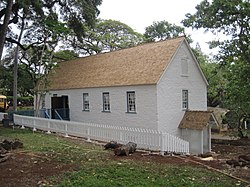Lahainaluna Seminary
| Lahainaluna High School | |
|---|---|
 |
|
| Address | |
|
980 Lahainaluna Road Lahaina, Hawaii 96761 United States |
|
| Information | |
| Type | Public, Co-educational |
| Motto | "O Ke'ia Ka Kukui Pio Ole I Ka Makani O Kauaula" |
| Established | 1831 |
| School district | Maui District |
| Principal | Ms. Joanne Dennis |
| Faculty | 61 (approx.) |
| Grades | 9-12 |
| Number of students | 1,063 (approx.) |
| Campus | Suburban |
| Color(s) | Red and White |
| Athletics | Maui Interscholastic League |
| Mascot | Lunas |
| Rival | Baldwin High School |
| Accreditation | Western Association of Schools and Colleges |
| Yearbook | Ka Lama |
| Military | United States Army JROTC |
| Website | http://lahainalunahs.org/ |
|
Hale Paʻi
|
|

Hale Paʻi
|
|
| Location | Lahainaluna High School, Lahainaluna, Hawaii |
|---|---|
| Coordinates | 20°53′24″N 156°39′36″W / 20.8899°N 156.6599°W |
| Built | 1834 |
| NRHP Reference # | 76000662 |
| Added to NRHP | May 13, 1976 |
Lahainaluna High School is a grade 9–12 public school located in Lahaina (on the island of Maui), Hawaii. It was founded in 1831 as a Protestant missionary school, originally named Lahainaluna Seminary. The early missionaries who arrived in Lahaina in 1823 explained to the Hawaiian Royalty the importance of an educational institution in the American style.
A number of the pioneers are buried in a small grave yard. It was the first formal European-American style school founded in Hawaii and has continued to operate.
American William Richards founded the missionary station in Lahaina in 1823. In June 1831 Lorrin Andrews was chosen as first principal of a seminary for boys and young men. The site was named Lahainaluna for "upper Lahaina". On September 5, 1831 classes began in thatched huts with 25 Hawaiian young men as students, including former royal historian David Malo. The second principal was William Patterson Alexander 1843–1856. The school eventually became part of the public school system in Hawaii. The post-secondary program later became developed as part of the first University of Hawaii.
Lahainaluna has a boarding program where students from the outer islands (including students from the "other side of the island") can live and study at either of the campus dormitories. In return, they work 18 hours per week doing various jobs around the campus. Initially and exclusively for males, the boarding program became coed in 1980. The two dorms are David Malo Dormitory for the boys and Hoapili Dormitory for the girls. Previously, Hoapili housed both genders. Lahainaluna is one of very few public boarding schools in the nation.
Twice a year, boarders lay a fresh coat of white lime on Pu'u Pa'u Pa'u in the shape of an 'L'. On the L is the year and number of athletic championships won the previous year. On a clear day, the freshly limed L can be seen from the island of Molokai. It is located at coordinates 20°53′15″N 156°38′29″W / 20.88750°N 156.64139°W.
...
Wikipedia

